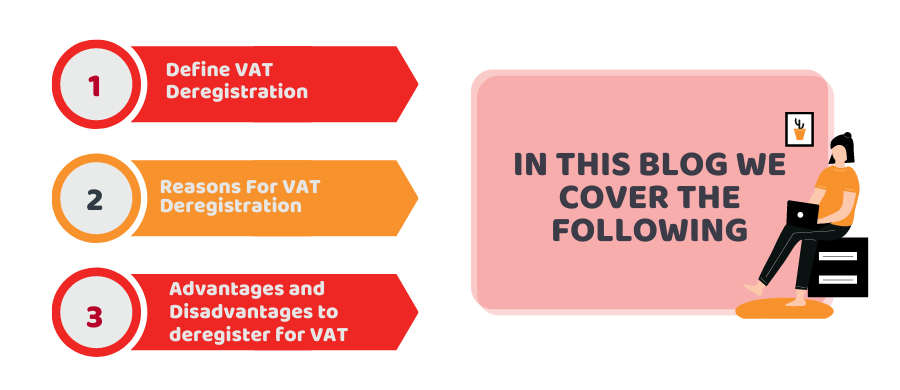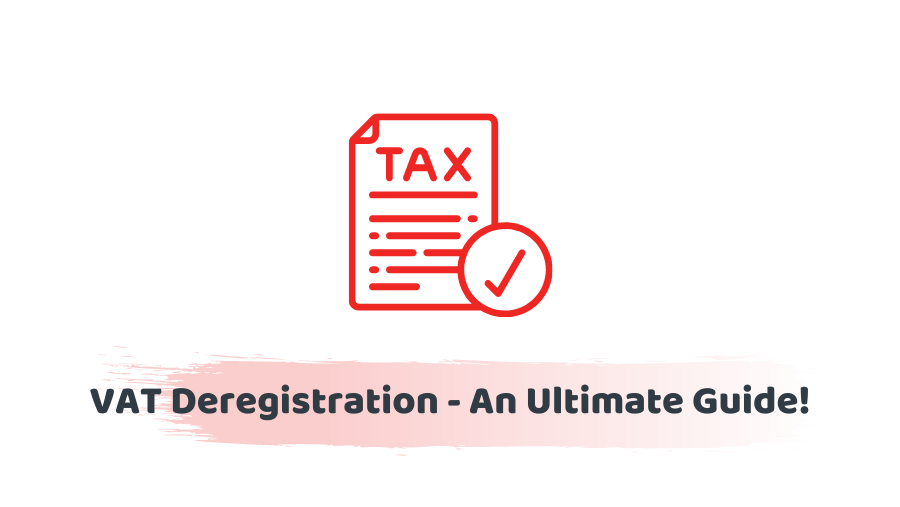The highest VAT registration is in the UK. According to research about 85,000 small businesses avoid registering or VAT which means 3.55 million. To deregister for VAT, the business has to be VAT registered first. The compulsion of annual turnover must fall below the VAT deregistration threshold.
Before we delve deep into knowing more about VAT deregistration, let’s have a quick look at what this blog post will cover today.
- Define VAT Deregistration
- Reasons For VAT Deregistration
- Advantages and Disadvantages to deregister for VAT

If you are keen to outsource your account departments or intend to grow your business beyond limitations, we have got you covered with professional solutions. Get in touch to get instant help!
Define VAT Deregistration:
In case your business is falling below the deregistration threshold, you are allowed to deregister for VAT. If your expectation says that taxable sales will go below the threshold, the situation will bring allowance as well. A business doesn’t have to be VAT registered. Rather there are circumstances in which deregister for VAT is a more suitable option.
Before you hop on to making a decision, it is important all surrounding circumstances, turnover, and consider your business activities. Sometimes you are unsure of where your business stand. If your business is experiencing turnover below the threshold, a prudent decision to consider is that you deregister for VAT until you can reclaim for such cost and remain VAT registered.
Before you decide on an unsure stage of your business, reach out to our experts for professional advice for a better understanding. Which will lead to wise and productive business decisions.
Reasons For VAT Deregistration:
There are two main reasons for a business to deregister for VAT.
- When it is not expected to have more taxable turnover than the deregistration threshold.
- When taxable supplies are stopped.
However, it is allowable to request for deregistration in certain situations which include the following.
- Ensure to convince HMRC about taxable turnover will not exceed the deregistration threshold for the coming 12 months.
- A section is close down in your business and you can satisfy HMRC that the turnover will not exceed.
Sometimes the situation makes you compel to deregister and there is no escape but to go for it. Otherwise, you can voluntarily do that. It is only possible to voluntarily do it if your turnover actually falls. However, if you foresee this happening in the future, HMRC might ask for a projected plan for the coming 12 months to provide enough proof for the authenticity of your request.
Below are the situations in which it is a must to go for deregistration:
- Any farming business that has joined agriculture flat rate scheme.
- A legal business entity changes from a sole trader to a limited company.
- When a business joins VAT group.
- If you intend to sell your business.
- you plan to cease taxable supplies and have no intention of trading in the future.
Advantages and Disadvantages To Deregister For VAT:
Like any other business affair, VAT deregistration comes with its pros and cons. Let’s start with the pros first.
Pros Of Deregistering:
- VAT receipts are no longer need to be recorded.
- You are free from account updated on a quarterly yearly basis.
- VAT returns and submissions are no longer required.
- It is easy to attract more and more clients by charging less than VAT registered companies.
- The customers will more probably be happy to maintain the same VAT inclusive prices.
- Protect yourself from taking over the threshold and enjoy.
Cons Of Deregistering:
- You can’t claim VAT on purchasing products.
- Large organizations would be less interested in doing business with you as they will take you as a small business.
- The accountants who used to handle this department will be handled less professionally.
- You will require to maintain records every month to avoid any ugly mishap in the future.
Conclusion:
To give final thoughts to the discussion of deregistering for VAT, we can say that it is a complex business affair. It comes with its own factors that are advantageous too. However, deregistering can seriously affect the growth of your business. To avoid compelling situations, it is wise to seek advice from professionals.
Hope this blog helped to understand deregistering better!
For more information on VAT deregistering and other business affairs, talk to our professionals at Accotax. Enjoy the sound of seamless processing!





















































